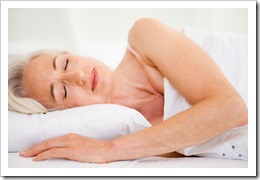The purpose of this study was to determine whether a combination of valerian/lemon balm could improve sleep problems in menopausal women. A total of 100 postmenopausal women aged 50-60 years with sleep disorders were studied. Women were selected randomly after fulfilling the entrance criteria. The Pittsburgh Sleep Quality Index (PSQI) questionnaire was completed to assess the status of their sleep disorder in the month prior. The PSQI consists of 7 measurements : general description of individual sleep quality and patterns, delay in the onset of sleep, sleep duration and pattern as well as waking in the night, use of tranquilizers, daily performance problems due to lack of sleep. A score of 5 or greater constitutes a sleep disorder and the 100 women selected were those with a scoring. Women were randomly divided into two groups with 50 women in the herbal treatment group and 50 in the control group containing starch. The herbal group received two capsules containing 160 mg of valerian and 80 mg of lemon balm. Participants and investigators and the statistician were all blinded. The duration of the intervention was one month and then followed by another PSQI questionnaire.
One month following the use of the valerian/lemon balm supplement, 36% of the treatment group and 8% of the placebo group showed an improvement in the quality of their sleep. Sleep disorder scores decreased by 5 points which was statistically significant.
Commentary: Perimenopausal and menopausal women are faced with hormonal changes that can result in not only night time hot flashes that can disrupt sleep, but lengthening in the time it takes to fall asleep, frequent awakenings, waking and poor return to sleep, early morning waking and non-restorative sleep. Botanical options that can improve any or all aspects of sleep disruption are an important part of a comprehensive approach to treating this. However, addressing sleep disorders in this population usually also involves strategies that target the fundamental issue, which is hormonal changes and the impact on neurotransmitters, cortisol, stress adaptation and sleep cycle physiology.
In 2011, another study of valerian and insomnia was published on the impact of valerian for sleep quality in postmenopausal women who were experiencing insomnia.[i] The postmenopausal women studied were generally healthy women aged 50 to 60 years who were menopausal for at least 1 year, were not using hormone therapy and were experiencing insomnia. One group of women were given capsules containing 530 mg of concentrated valerian extract twice per day and the other group was given placebo twice per day, for 4 weeks. A statistically significant change was reported in the quality of the sleep in the valerian group when compared to the placebo group. The average scored on the sleep scale before valerian was 9.8 and after valerian it was 6.02. The placebo group had an initial average sleep scale score of 11.1 and after placebo, 9.4. Overall, 30% of the women taking valerian and 4% taking placebo reported an improvement in their sleep quality.
Although not all research on valerian and insomnia have resulted in positive results, the current study with the valerian in combination with the lemon balm in menopausal women, along with the 2011 valerian study in menopausal women, bring more focus to using valerian in menopausal women for sleep disorders.
References
Taavoni S, Nazem ekbatani N, Haghani H. Valerian/lemon balm use for sleep disorders during menopause. Comp Therapies in Clinical Practice 2013;19:193-196
[i] Taavoni S, Ekbatani N, Kashaniyan M, Haghani H. Effect of valerian on sleep quality in postmenopausal women: a randomized placebo-controlled clinical trial. Menopause 2011; 18(9): 951-955.

